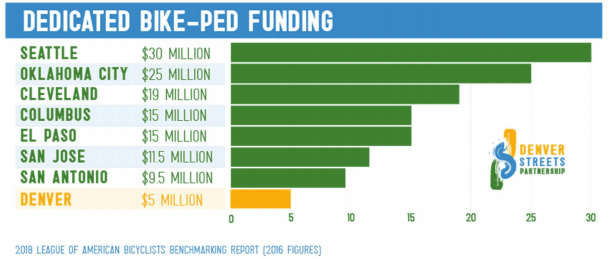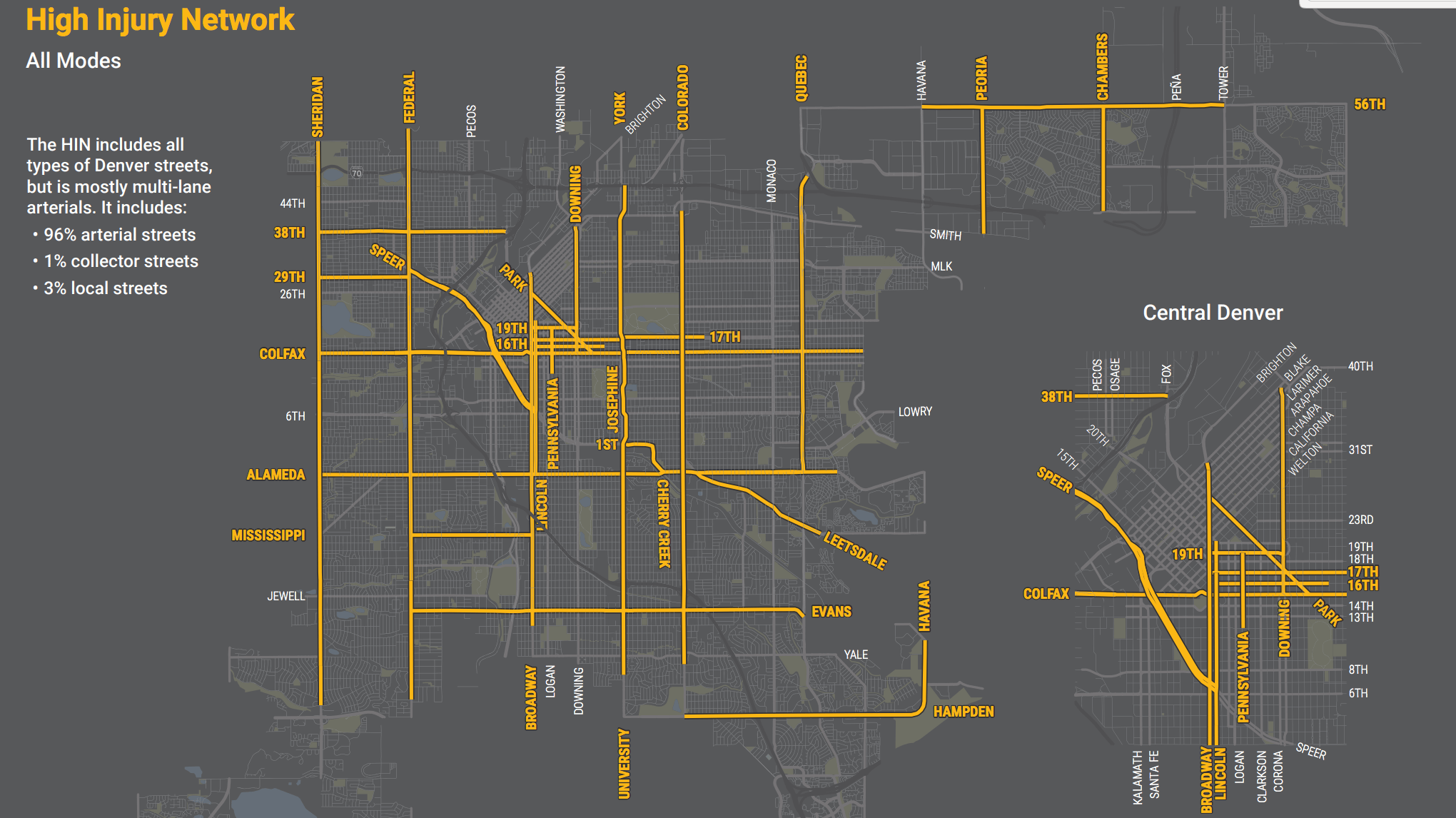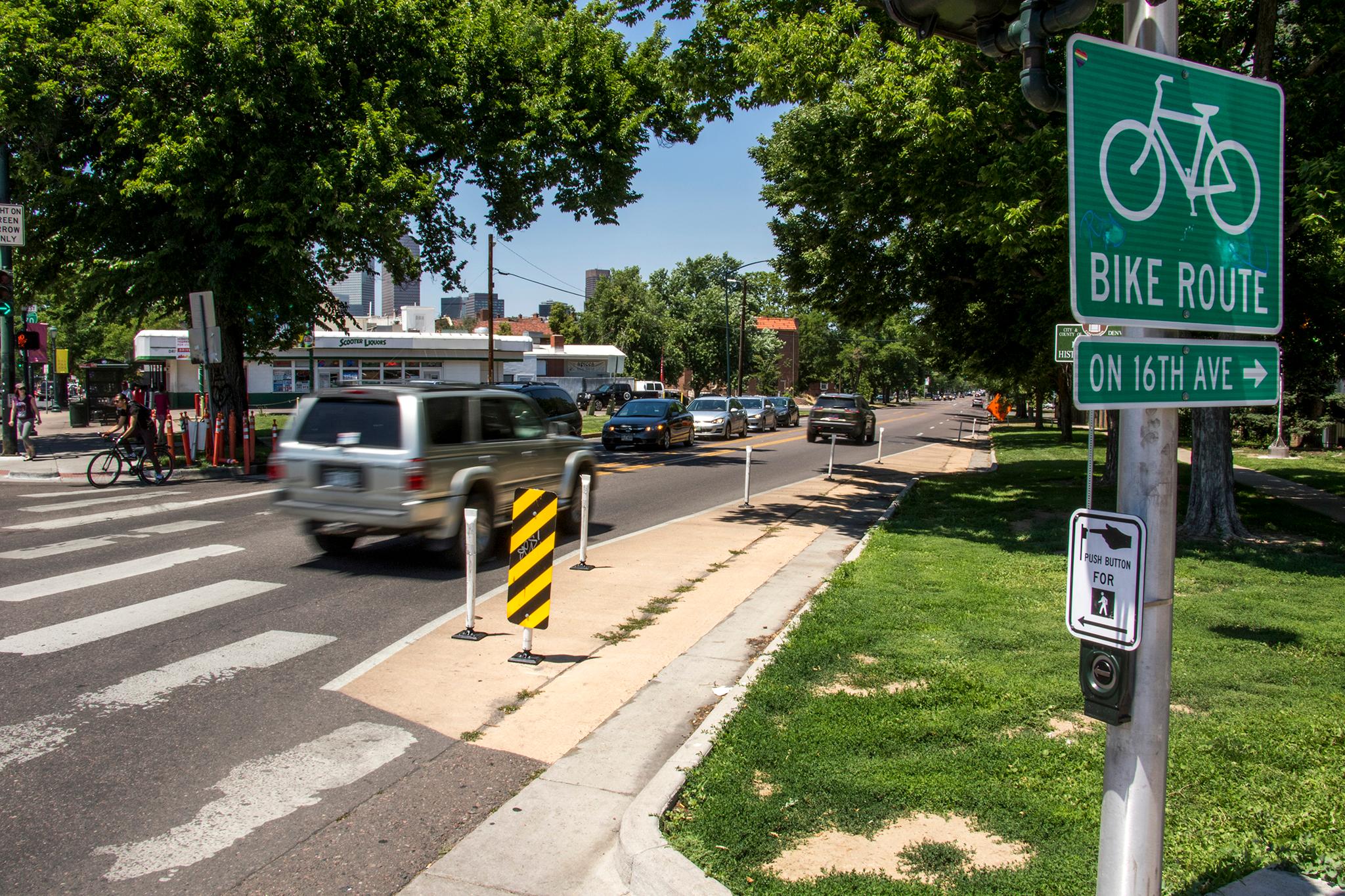Pedestrians and bicyclists in Denver are facing a "public health crisis," according to the Denver Streets Partnership, a coalition of advocacy groups who are focusing on making Denver's streets people-friendly.
"What's lacking is a sense of urgency," said Jill Locantore, executive director at WalkDenver. "Every week our city delays making investments in safety improvements to our streets, another life is lost. Since January of this year, 29 people have been killed just trying to get around our city. Sadly, the transportation options that are healthiest and most affordable are also the most deadly in Denver, thanks to poor street design."
DSP held a press conference on Tuesday on the corner of Franklin Street and Colfax Avenue — an intersection, according to DSP, that was once one of the most dangerous in the city until Denver Public Works gave it a low-cost makeover. With the addition of safety paint and several flex posts to create clearer lane paths, DSP believes pedestrians are now able to safely cross the five lane intersection.
The partnership called for increased investment in infrastructure for car-alternative forms of transportation Tuesday, saying that in studies that compare Denver’s financial investment in bicycle and pedestrian infrastructure to its cities like Seattle, Cleveland and Oklahoma City, we lag significantly.
“Denver's transportation system is out of balance. We've spent decades funding inefficient ways to get around, like driving alone in your car,” said Piep van Heuven, Denver director of Bicycle Colorado. “Fundamental to all of these requests is our request to fund an update to the Denver street design standards. They are woefully out of date. These are the street design standards our traffic engineers use when they are designing the ways that we get around.”
Seattle, in fact, spends about $30 million a year for the upkeep and improvement of infrastructure for bikes and pedestrians, while Denver spends, approximately $5 million a year on the same types of infrastructure, according to a report released by DSP. Jaime Lewis, the transit advisor at the Colorado Cross-Disability Coalition, noted that not everything is simply about spending, but budgets give a clear indication of what the a city's priorities are.

DSP called for budget changes in 2019, including:
- At least $10 million for new sidewalks where they are missing on the city’s "high-injury network," the 5 percent of streets where 50 percent of traffic fatalities occur

- At least $6 million for new bike lanes to connect neighborhoods in the center city
- At least $5 million for safety improvements on Federal Boulevard, which has a traffic fatality rate 20 times the average for urban streets in Colorado according to WalkDenver
- At least $1 million for quick, low-cost improvements that can enhance safety immediately while the city finds additional funding for longer-term improvements
- Funding to update Denver’s street design standards
The partnership has criticized Mayor Michael Hancock for slow progress towards the city's Mobility Action Plan, which is supposed to change Denver’s transit landscape dramatically by 2030. They acknowledged that the GO Bond will provide some additional money for infrastructure improvements, but van Heuven compared that to getting a salad, where DSP's budget requests would be more akin to a main course.
DSP claimed that if the city continues at its current pace, it will take more than 100 years before all the necessary improvements are complete. The group also emphasized the low-risk, high-reward nature of immediately funding the million dollars they have requested for easy safety improvements, like safety paint to create visibility and more explicit paths for both motorist and pedestrians.
According to DSP, the city has committed to the following this year:
- Building 14 miles of new sidewalks
- Building 20 miles of new bike lanes
- Installing or upgrading pedestrian crossings at three locations
- Redesigning two intersections to increase safety
- Implement operational improvements at 10 intersections
- Implement “Smart City” technologies at 10 intersections
- Implement traffic calming on one corridor
- Enhance street lighting to improve safety on two corridors
Early in the year in 2019, DSP plans on checking in on the city’s progress and evaluating whether the city is, in fact, making access to transit easier for all Denver residents.
“DSP believes that everyone deserves people-friendly streets, from 8 years old to 80 years old,” van Heuven said.
Public Works responded to the press conference with a statement that reaffirmed the city's financial commitment the Mobility Action Plan and noted that the department will be happy to work with DSP going forward.












